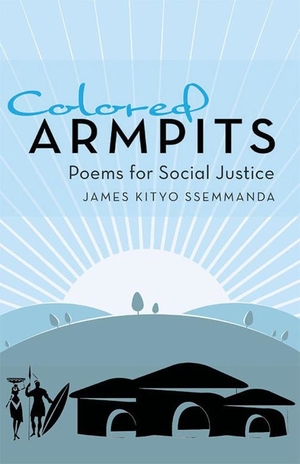Ugandan born poet Ssemanda casts light on critical issues that we all need to explore in the collection of personal, political, and perceptive works, Colored Armpits: Poems for Social Justice.
Ssemanda’s book of verse is divided in three sections – “The Mzungu,” “The Armpits,” and “The African African.” Each touches on different aspects of the human condition, and particularly, the condition of African and other third world people in connection or confrontation with first world denizens and value systems.
Mzungu is the African language term used in Uganda and elsewhere to designate white people – whether they be colonialists, missionaries, or tourists. His opening poem, “The Painter,” offers a sardonic suggestion on the coloring of a mzungu subject:
Give them an accentuated white
With a credulously enhanced superiority
In “Does It Matter?” the poet contemplates the potential virtues of various racial or ethnic groups – white, Jewish, black, African or Asian:
It doesn’t matter, as long as you care.
What you need is joy
That goes beyond outward show
And freely caring
To all without disdain
And discrimination.
Ssemmanda introduces “My Two Friends” – who are friends to him, but “fiends” to one another, as one is Palestinian, the other Jewish:
Each had a story, a powerful story.
How can I help them?
To live with their stories.
The Armpits hones in on the more personal relations between white and black. When a woman on a city train, perhaps in the UK, moves away when he sits next to her, he hears the train’s rhythmic voice saying, “There is still more to do – more to do.” In these moments the subtitle “Poems for Social Justice” comes to the fore. He frequently mentions his “big Ganda nose” and “Ganda accent,” examining the different features that people of other races seem to note in him.
The African African focuses on the extremes of experience that cause people to leave their homes, suggesting that, “Our countryman in the diaspora has lost himself…” The poet mildly mourns the change in his young “Lost Child” who “scorns my language” and “runs at the sight of a butterfly,” while her African brother “kills lions.”
Ssemanda was able, with the aid of the Ford Foundation, to depart from Uganda, a country that has seen and suffered extreme strife and deprivation, and to study and work abroad as well as back in his home country. He received an International Ford Foundation Fellowship for his role in promoting social justice and was selected for the 2012 Hrant Dink Foundation recognition as “an inspiration to humanity.” He notes this distinction in the poem “He Won an Award” reminding the reader that, despite this honor, “I am a simple man.”
His poetic works are short, free verse, most containing serious, thought-provoking messages for his fellow Africans, and for all who live elsewhere but need to be informed and reminded of the still-distressing conditions elsewhere beyond the so-called “free world.” In “Woes of the Sad World,” regarding dictators of whatever homeland, whatever era, he sagely opines:
He is the country, and the country is him
In the third world,
Or is it the sad world?
This type of mournfulness lingers through each poem. The poems do not necessarily focus on setting or history, but emotion. This is not always effective, as the poems sometimes reside on the the surface of these issues. However, there is a method to Ssemanda’s focus, as the emotion inspired by these poems becomes the subject, rather than factual detail. On the whole, this is a unique and emotive collection that opens the reader’s awareness to vitally important issues through poems that are at once plaintive and uplifting.
Book Links
STAR RATING
Design
Content
Editing
Get an Editorial Review | Get Amazon Sales & Reviews | Get Edited | Get Beta Readers | Enter the SPR Book Awards | Other Marketing Services
























Leave A Comment